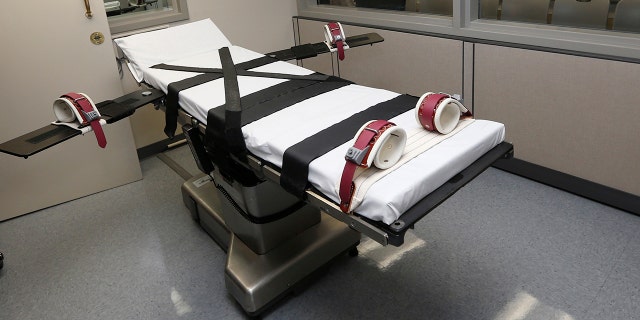Oklahoma officials are accusing the federal government of playing politics with its refusal to transfer a death row inmate scheduled to face execution in December to state custody.
The state is now suing the Biden administration to ensure he is handed over.
John Hanson, 58, is scheduled to be executed for the 1999 murders of Mary Bowles and Jerald Thurman. He is currently being held at the Federal Correctional Complex in Pollock, Louisiana, and has a last-ditch Nov. 9 clemency hearing in Oklahoma.
However, the Federal Bureau of Prisons has said handing Hanson over to state authorities “is not in the public interest.” Tulsa County District Attorney Steve Kunzweiler said no one has explained to him why Hanson is being withheld but cited the Biden administration’s stance on the death penalty.
“It smacks of politics,” he told Fox News Digital. “They’ve not outlawed the death penalty, but they’re certainly not allowing any action on that. OK fine, if that’s what you want to do at the federal level, but this is a state case. They’re usurping state authority.”
John Hanson is scheduled to be executed in Oklahoma in December for the 1999 murders of Mary Bowles and Jerald Thurman. A fight between state and federal authorities has ignited over whether he will be transferred to Oklahoma to face execution.
(Tulsa County District Attorney)
In 2000, Hanson was sentenced to life in prison, plus an extra 107 years by a federal court for a string of armed robberies. He was later handed a death sentence by an Oklahoma court for the 1999 killings.
Hanson and Victor Miller abducted Bowles, 77, from a shopping mall and then drove her to an isolated area where they shot and killed her and Thurman, 44, an innocent bystander.
In August, Kunzweiler requested that Hanson be transferred to state custody so he can attend his clemency hearing, and, if denied, face execution on Dec. 15. He has requested assistance from the office of state Attorney General John O’Connor after receiving a denial letter from the Bureau of Prisons.
“(The law) authorizes the Bureau of Prisons to transfer a prisoner who is wanted by a State authority to that State authority’s custody if it is appropriate, suitable, and in the public’s best interest,” the BOP letter states. “The Designation and Sentence Computation Center (DSCC) has denied the request for transfer, as it is not in the public’s best interest.”
Kunzweiler criticized the letter as being vague and demanded a reasonable explanation.
“This is not an unusual dynamic where you’re asking one jurisdiction to facilitate to another jurisdiction,” he said. “I’m angry, and I want to find out how high this thing goes up.”
The Bureau of Prisons told Fox News Digital it declined to comment on the matter.

Photo shows the gurney in the the execution chamber at the Oklahoma State Penitentiary in McAlester, Okla.
(AP Photo/Sue Ogrocki, File)
“Based on privacy, safety, and security reasons, we do not comment on inmate’s conditions of confinement, to include transfers or reasons for transfers. Therefore, we have no information to provide,” the agency said.
A state appeals court overturned Hanson’s death sentence in 2003, but he was re-sentenced to the same fate after a 2006 trial. Miller, who also participated in the murders, was sentenced to death in a separate trial and later re-sentenced to life in prison after prosecutors dropped their pursuit of the death penalty following years of back-and-forth within the court system.
CLICK HERE TO GET THE FOX NEWS APP
The lawsuit was filed Tuesday in Texas by O’Connor and Kunzweiler. The state said Hanson’s execution was being “collaterally attacked by bureaucrats in the executive branch.”
“Hanson’s execution by the State of Oklahoma is consistent with any public interest in seeing that Hanson never be released from custody during his lifetime,” court documents state. “The public has no interest in which sovereign keeps Hanson in custody during that lifetime, and the public certainly has no interest in allowing a murderer to escape the death penalty because he also happened to commit robberies prosecutable under federal law.”
The lawsuit names BOP Director Colette Peters, Heriberto Tellez, the BOP director for the agency’s South Central Region and other officials as defendants. The suit is asking that Hanson be handed over to Oklahoma authorities.
Throughout the saga, Kunzweiler has repeatedly taken issue with the federal government’s stance that transferring Hanson to Oklahoma would not serve the public’s interest.
“I want to know what that means,” he said. “I would suspect the 12 jurors in Oklahoma know what’s in the public best interest locally.”